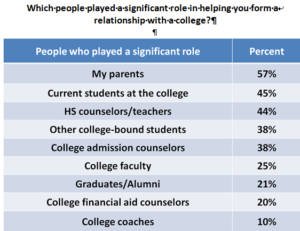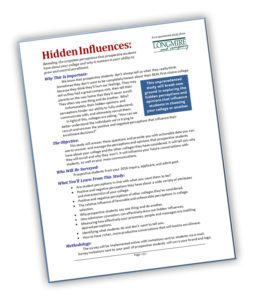In our latest co-sponsored study, “The Relationship Dynamic,” we asked over 12,000 college-bound students, “Who played a significant role in helping you form a relationship with your chosen college?” Many mentioned the current students who attend the college. Others mentioned their high school counselors and teachers. College admission counselors played a significant role for many. But topping the list? Parents.
We all know that parents influence college selection. That’s not news. But they are much, much more than influencers.
Parents not only influence, they facilitate the relationship between the student and the college of choice.
Are you fully leveraging the influence these facilitators have in shaping the college selection decisions of their sons and daughters. Are you fully serving parents? Have you focused on what’s important to them? Their feelings and emotions? Have you made them part of your recruiting team? If not, you are missing out on the support of possibly your biggest champions. Imagine the impact of turning these key influencers into your college’s top advocates.
 In a separate Longmire and Company co-sponsored study, “Your Value Proposition,” we measured the relative influence of parents and students in driving the college selection decision. Both parents and students agreed: the student has the most influence. Parents want their child to be happy and, if that lays the foundation for their success in college, then parents are willing to subordinate their own preferences and concerns.
In a separate Longmire and Company co-sponsored study, “Your Value Proposition,” we measured the relative influence of parents and students in driving the college selection decision. Both parents and students agreed: the student has the most influence. Parents want their child to be happy and, if that lays the foundation for their success in college, then parents are willing to subordinate their own preferences and concerns.
However, parents are not shy about influencing the college selection process before the final decision is made. In our “Study of Parents,” we uncovered numerous examples of mothers and fathers hiding or disposing of college marketing material before their child would see it. Conversely, the same parents advocated for specific colleges even though the student had not expressed an initial interest in the school.
Results from the current “Relationship Dynamic” study make it very clear: Parents are not just influencing the college selection process, they are active facilitators in leading their child to or away from colleges. 
In light of this, more colleges are building a separate but equal marketing and “recruiting” track aimed at parents. It’s an acknowledgement that parents can and should be served during the college selection process, and that they can be an important conduit to facilitate the relationship between the prospective student and the college.
Laura Hamilton, associate professor of sociology at the University of California, and author of Parenting to a Degree: How Family Matters for College Women’s Success, has researched this in great detail. In The Atlantic, “The Partnership Between Colleges and Helicopter Parents,” she writes “…parents typically bring more than funds alone. They often help promote the university; conduct admissions interviews; interface with donating alumni; assist with their own students’ emotional, cognitive, and physical needs…. Competition to attract these parents is stiff—and administrators’ complaints about parental ‘meddling’ are now tempered with interest in a ‘partnership relationship’ with parents.”
We couldn’t agree more! And so do many of our college clients. A growing number of colleges are building communications flows and ongoing conversation streams with parents. If you want to begin doing the same or enhancing what you already do then take these steps.
The Parent Track: Quick Start Guide
- Ask permission first. Establish a separate but equal relationship with them, provided the student and parent are comfortable doing so. Admission counselors tell us that most prospective students are happy to give permission for direct communication with their parents, and that parents often consider the request evidence of a higher level of service from the college or university.
- Seek opportunities for one-on-one interactions. Call the parent while the student is at school, for instance. Structure your campus visits so that you have some time with both the student and parent, separately. In every conversation with the parent ask open-ended questions that will help you gain insight to the student: “What attributes are most important to Jamie in a college?” “What do you think should be most important?” “Has Jamie developed strong relationships with any colleges in particular?” “Is there anything I can show her about our college that would help her decide?” “What do you think would get her excited about our college?” Parents will often share details that students will not.
- Identify their communication and content preferences. Find out what information they need and want from you. Find out when they need it. Find out how they would like it delivered (email, mail, text, phone call, campus visit, etc.).
- Make connections. Connecting the parent to “third-party” supporters can go a long way toward building your relationship. Some colleges have established parent “mentor” programs to introduce parents of prospective students to those to parents who have successfully navigated the process. Your goal is to network the parent to someone with a shared perspective that they trust; look for parents of successful students or graduates or alumni that live in the same city.
Creating relationships is a multifaceted, nuanced and crucial part of student recruitment A strong bond with a parent can provide the guidance and help you need to better understand the value propositions that will be attractive to the prospective student. Ultimately, you and the parent both share the same objective: A successful, productive, happy college experience for the student.
Engaging with parents to this degree involves an investment in time and money. But it’s an investment you and your team need to make. If you elect to invest in this effort then you’re effectively doubling your recruiting team. You are enlisting the help and support of someone “on the inside” who has the full faith and trust of the college-bound student.
The soon-to-be released “Relationship Dynamic” report is loaded with powerful information that will help you build stronger bonds with the students you are recruiting. If you want a copy of the full public report, you can CLICK HERE to place your name on the distribution list.
Become a co-sponsor of our next study and get insight into YOUR pool of prospective students!
| Prospective students don’t always tell you what they’re thinking. Or they don’t want to be completely honest about their REAL first-choice college because they think they’ll hurt your feelings. Or they say one thing and then do another.
Their hidden perceptions and motivations impact your ability to effectively communicate with and ultimately recruit them. This new study is going to do a deep dive on the hidden perceptions that influence students in choosing a college. Colleges get involved in our co-sponsored studies because they capture fascinating and actionable data specific to their pool of prospective students. As a co-sponsoring institution you will receive comprehensive and customized reporting that compares your data with national data. In addition, Longmire and Company will create and deliver a customized webinar for you and your staff to make specific recommendations for acting on the findings. |
 Rick Montgomery is as an Enrollment Strategist at Longmire and Company. With over 20 years in higher education marketing, he brings an innovative and dynamic approach to helping colleges and universities meet their enrollment goals. Rick can be reached at 913/492.1265 x.708 or via email at rmontgomery@longmire-co.com.
Rick Montgomery is as an Enrollment Strategist at Longmire and Company. With over 20 years in higher education marketing, he brings an innovative and dynamic approach to helping colleges and universities meet their enrollment goals. Rick can be reached at 913/492.1265 x.708 or via email at rmontgomery@longmire-co.com.





